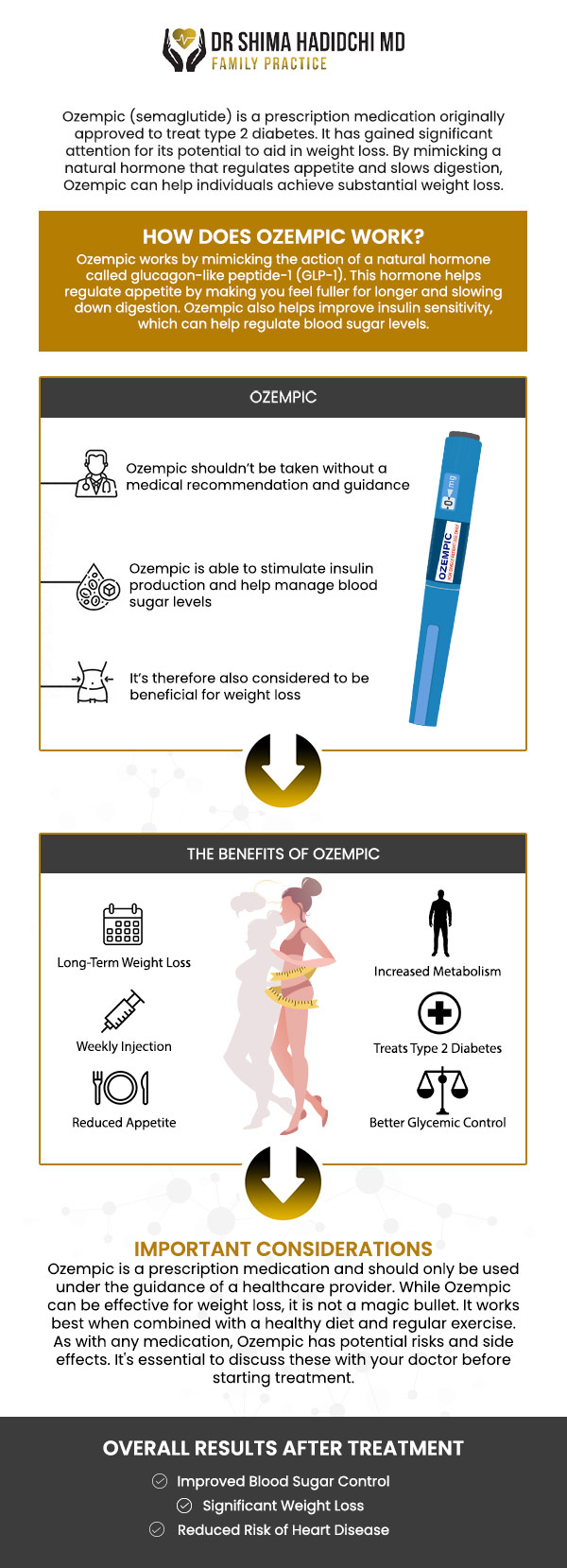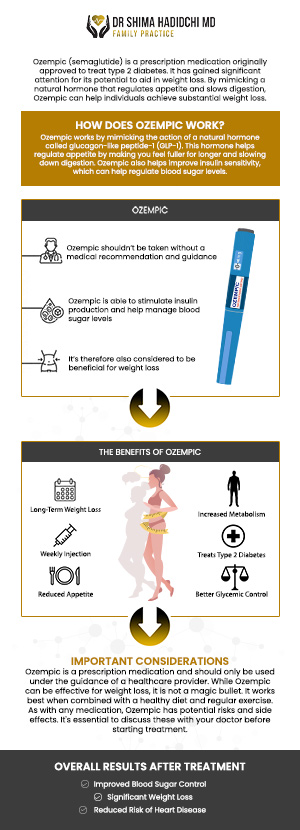Is Ozempic® the Same as Insulin?
Ozempic is not the same as insulin. It is a GLP-1 receptor agonist that helps manage blood sugar by stimulating insulin release when blood glucose levels are high. While insulin is used to regulate blood sugar directly, Ozempic also aids in weight loss by reducing appetite and promoting satiety. For trusted care and weight loss support, consult Dr. Shima Hadidchi, MD. For more information, contact us today or book an appointment online now! We have convenient locations to serve you in Apple Valley, CA and Victorville, CA.




Table of Contents:
How does Ozempic® work compared to insulin?
What is the difference between Ozempic and insulin?
Can Ozempic® be used in combination with insulin?
What are the primary benefits of Ozempic® over insulin?
Ozempic® and insulin are both medications used in the management of diabetes, but they function in fundamentally different ways and are used for different aspects of diabetes control. Ozempic® (Semaglutide GLP-1) is an agonist of the GLP-1 receptor, a type of medication that mimics the incretin hormones in the body, which are released after eating. GLP-1 receptor agonists work by stimulating insulin release in response to high blood sugar levels, inhibiting glucagon release after meals, and slowing gastric emptying to help decrease appetite and food intake. Blood sugar levels rise more steadily as a result of this rather than experiencing the typical diabetes-related spikes.
Conversely, the hormone insulin directly lowers blood glucose levels by promoting the transfer of blood sugar into the cells. People with type 1 diabetes lack insulin production and require insulin therapy for survival, while those with type 2 diabetes might use insulin when other medications are insufficient to control their blood glucose levels.
The fundamental difference between Ozempic® and insulin centers is their distinct mechanisms of action and their specific roles in managing diabetes. Insulin functions as a direct intervention that lowers blood glucose levels by promoting the absorption of sugar into the body’s cells, crucial for both types of diabetes. In contrast, Ozempic® (Semaglutide GLP-1) works as a GLP-1 receptor agonist that mimics natural hormones in the body that regulate blood sugar levels after eating. By improving the body’s innate capacity to generate insulin in response to elevated blood glucose levels, Ozempic® contributes to the maintenance of more stable blood sugar profiles all day. Additionally, it helps suppress appetite and slow gastric emptying, which contributes to weight loss—a significant advantage over insulin, which is often associated with weight gain. Unlike insulin, which may require several injections daily based on the patient’s glucose levels and dietary intake, Ozempic® offers the convenience of a once-weekly injection. This makes adhering to the treatment plan simpler and increases the compliance of patients who are taking care of their diabetes, providing a sustained therapeutic effect with fewer doses. Thus, Ozempic® represents a shift towards more integrated, holistic management of diabetes, addressing multiple aspects of the disease beyond just glucose control.
Yes, Ozempic® and insulin can be used together. This is especially true for type 2 diabetic individuals whose blood sugar management goals are not being met by insulin alone. The combination can be beneficial because Ozempic® and insulin function in various capacities to regulate blood sugar. While Ozempic® reduces the amount of glucagon the body makes and slows digestion, insulin directly lowers blood glucose levels. However, combining these medications should be done under strict medical supervision to avoid potential risks such as hypoglycemia, where blood sugar levels drop too low.
Ozempic® offers several benefits over insulin, particularly for people with type 2 diabetes, making it a preferred option for many. One significant advantage is weight loss; unlike insulin, which can often lead to weight gain, Ozempic® is associated with weight loss in many patients. This effect results from its ability to slow gastric emptying and decrease appetite. Clinical trials have also demonstrated that Ozempic® lowers the risk of significant cardiovascular events such heart attacks and strokes, which is a significant benefit not directly offered by insulin.
Another key benefit is a lower risk of hypoglycemia. Because Ozempic® enhances the body’s own insulin production rather than directly injecting insulin, it generally poses a lower risk of causing hypoglycemia, especially when used alone. Moreover, the convenience of Ozempic® is notable; its once-weekly injection schedule greatly improves convenience and adherence compared to the more frequent dosing requirements of insulin.
In conclusion, while both Ozempic® and insulin effectively manage blood glucose levels in diabetes, they offer different benefits and work in distinct ways. To find out which medicine, or combination of medications, is most appropriate for their unique medical needs and lifestyle, patients should speak with their healthcare providers. For more information, contact us today or book an appointment online now! We have convenient locations to serve you in Apple Valley, CA and Victorville, CA. We serve patients from Apple Valley CA, Victorville CA, Spring Valley Lake CA, Hesperia CA, Baldy Mesa CA, Mountain View Acres CA, Adelanto CA, and surrounding areas.

Check Out Our 5 Star Reviews


Additional Services You May Need
▸ Telemedicine
▸ Family Practice And Primary Care
▸ Walk-Ins
▸ Weight Loss Management
▸ Zepbound for Weight Loss
▸ Women’s Health
▸ Vaccinations & Immunizations
▸ Diabetes Management
▸ Geriatrics
▸ Pediatrics
▸ Internal Medicine
▸ Acne Treatment
▸ Cryotherapy Treatment
▸ Skin Lesion Removal
▸ Dementia Treatment
▸ Semaglutide GLP-1 Injections

Additional Services You May Need
- Telemedicine
- Family Practice And Primary Care
- Walk-Ins
- Weight Loss Management
- Zepbound for Weight Loss
- Women’s Health
- Vaccinations & Immunizations
- Diabetes Management
- Geriatrics
- Pediatrics
- Internal Medicine
- Acne Treatment
- Cryotherapy Treatment
- Skin Lesion Removal
- Dementia Treatment
- Semaglutide GLP-1 Injections








